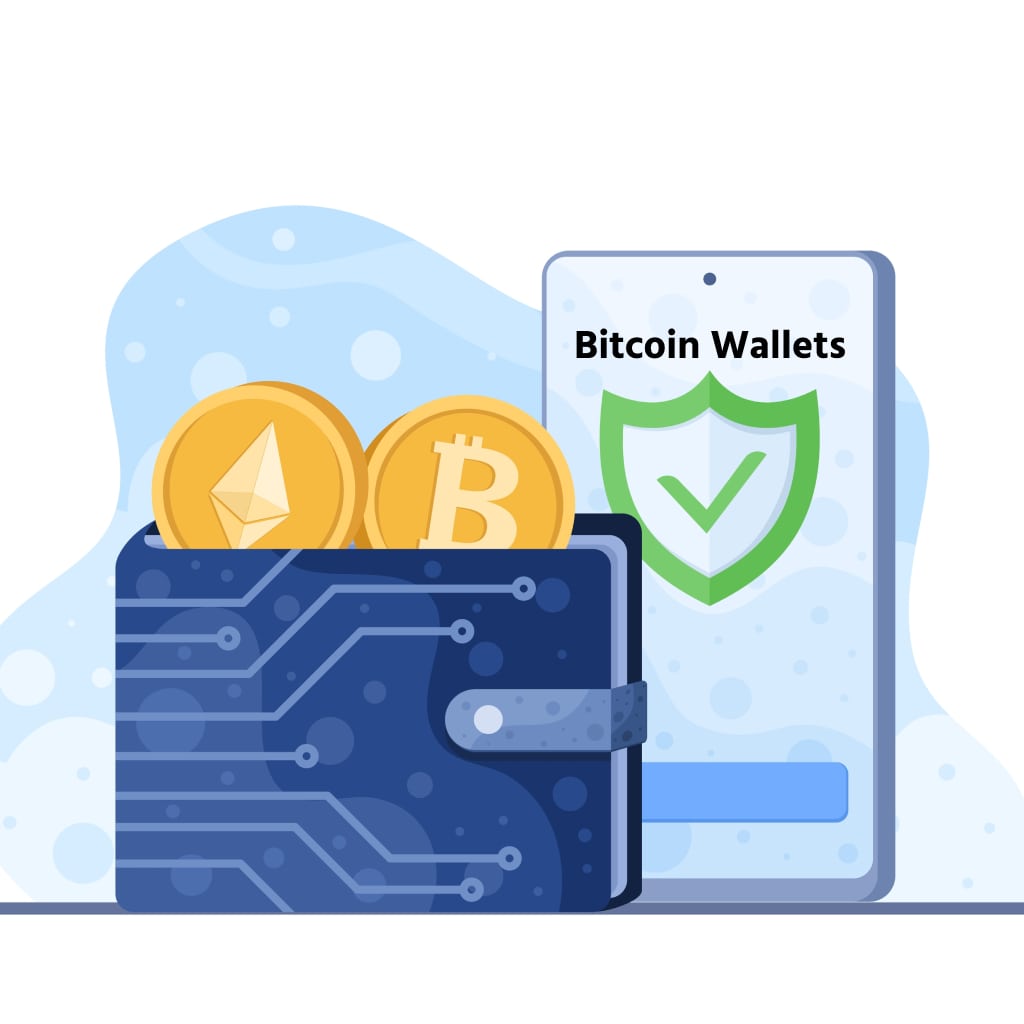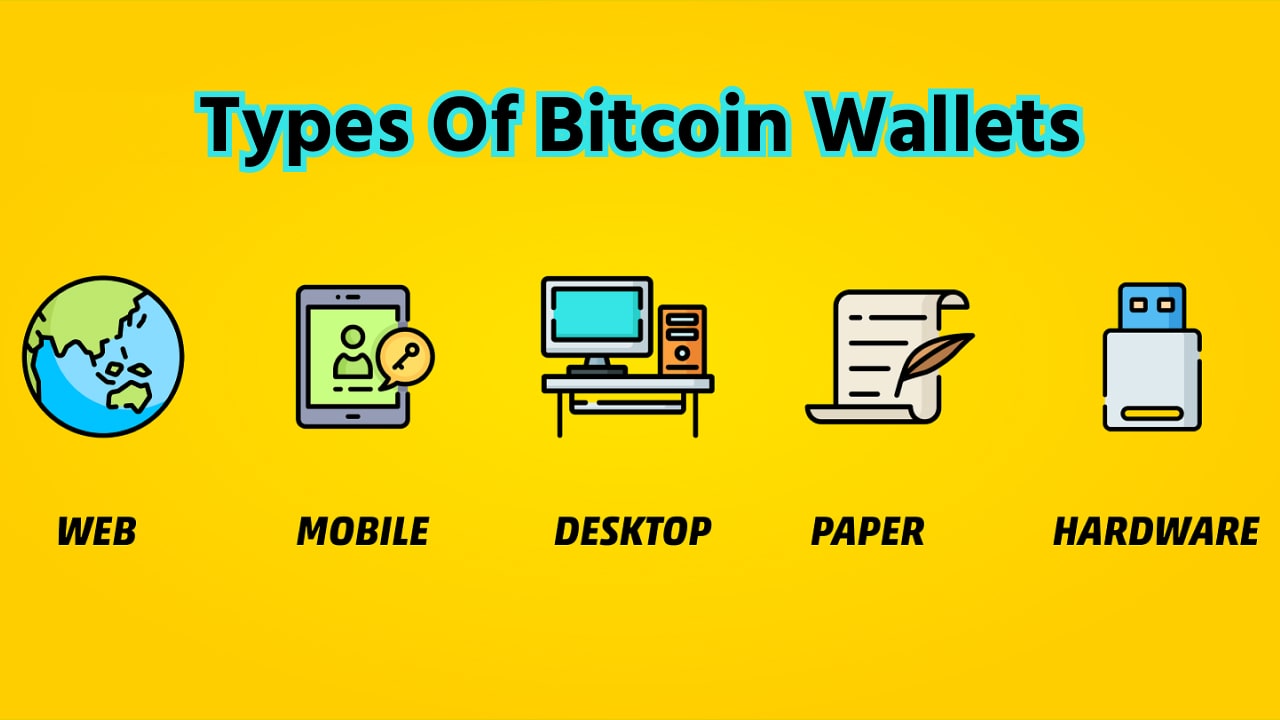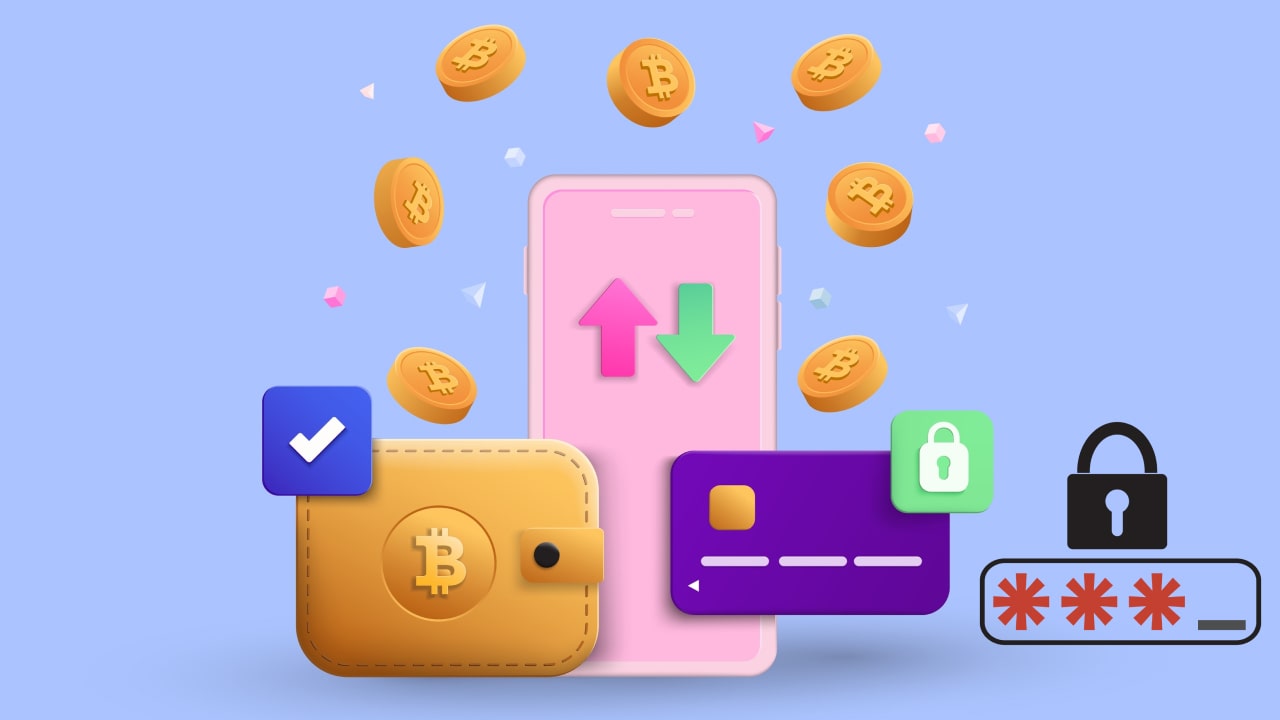Best Bitcoin Wallets for Beginners

In the changing world of currencies effectively managing your assets relies on having a Bitcoin wallet or a crypto wallet. These virtual safes serve as the gateway to your wealth, allowing you to store, transfer and safeguard your assets. Whether you’re new to the realm of finance or a seasoned investor understanding the intricacies of a wallet or a crypto wallet is essential for navigating this ecosystem. Join us as we delve into these protectors, unravel their functionalities and learn how to fortify your investment portfolio.

Bitcoin Wallets for New Users
In delving into cryptocurrency? Look no further than wallets! For beginners choosing the Bitcoin wallet is crucial for managing your assets. Whether you prefer the convenience of desktop wallets or prioritize the security offered by wallets like hardware or paper options there’s a solution for your needs. Hot wallets provide access for transactions while cold wallets offer protection against threats.
Equipped with features such as two factor authentication, multi signature support and regular backups these wallets ensure that your Bitcoin remains secure and readily accessible at all times. Whether you’re just beginning to explore the world of cryptocurrency or an experienced investor seeking to diversify your holdings, selecting the Bitcoin wallet is a step towards financial independence in this digital age.
What Is A Bitcoin Wallet?
So what’s the deal, with a wallet? It’s basically a tool designed to store send and receive Bitcoin, the currency. Think of it like your wallet that holds your cash and cards –. Instead a Bitcoin wallet holds cryptographic keys that are crucial for managing and accessing your assets.
These wallets come in forms, such as software apps, hardware devices or even paper printouts. At its core a Bitcoin wallet consists of two parts; a key for receiving funds and a private key for authorizing transactions. In essence, a Bitcoin wallet allows users to interact with the Bitcoin network by facilitating transactions and providing storage for their wealth.
How Do Bitcoin Wallets Operate?
Ever wondered how these crypto wallets actually work? Let’s take a peek behind the curtain and explore the workings of these digital tools! Your Bitcoin wallet acts as a hub that efficiently handles transactions within the realm of the Bitcoin network. Here’s how it all plays out:
- Safeguarding Your Assets: Your Bitcoin wallet ensures the security of your wealth through two keys – a key ( to an account number) and a private key (your super secret code).
- Making Transactions: When you decide to send some Bitcoins your wallet springs, into action. It uses your key to authenticate the transaction ensuring it’s really you giving the approval.
- Journey in Blockchain: Your approved transaction travels through the blockchain, which’s like Bitcoins ledger. Miners, acting as guardians of the blockchain. Confirm your transaction to validate its authenticity.
- Confirmation and Record Keeping: Once miners approve it your transaction gets a seal of approval. Its permanently logged on the blockchain for everyone to see – like making history!
- Receiving Bitcoin: When you receive Bitcoin your wallet generates a key (your receiving address) for others to send Bitcoin to. Your private key ensures that only you can access the funds sent to this address.
- Continuous Protection: Behind the scenes your Bitcoin wallet consistently boosts its security by updating protocols to stay ahead of risks.
So there you have it – your Bitcoin wallet plays a role in safeguarding your assets in the world of cryptocurrency ensuring they’re secure and easily accessible.

Types Of Bitcoin Wallets For Beginners
For newcomers stepping into the world of Bitcoin, understanding the wallet options is crucial. Let’s explore two categories. Wallets and cold wallets – each designed with specific purposes, in mind to protect your Bitcoin holdings.
Hot Wallets
When it comes to wallets they’re, like wallets accessible online giving you instant access to your Bitcoin funds. However, this convenience does come with a compromise on security. Here’s a breakdown:
- Web Based Wallets: These are accessible through web browsers and platforms like Blockchain.com and Coinbase, making Bitcoin transactions quick and easy.
- Mobile Wallets: Designed for smartphones mobile wallets such as Trust Wallet and Bread Wallet allow you to manage your Bitcoin on the move ideal for transactions.
- Desktop Wallets: Installed on your computer desktop wallets like Electrum and Exodus offer full control over your Bitcoin assets but require you to keep your device safe from online threats.
Cold Wallets
Crypto cold wallet’s focus on security by storing Bitcoin offline. While they may be less convenient than wallets they provide protection against hacking. Here are two types to consider:
- Paper Wallets: These involve printing your keys on paper for security. Remember to keep that paper safe!
- Hardware Wallets: Devices such as Ledger Nano S and Trezor act as vaults, for keeping Bitcoin keys offline. Safeguarded from online threats.
What Is A Hardware Wallet?
Well, it’s essentially a device that resembles a USB stick and is designed specifically to safeguard your Bitcoins offline. Yes you ‘heard that right – offline! This means your precious digital currency is shielded from threats like hackers and malware.
The hardware wallet is securely. Stores your keys in a secluded space away from prying eyes. When you wish to conduct a transaction simply connect your hardware wallet to your computer or phone authenticate the transaction with a PIN or password. There you have it – your Bitcoin is securely on the move.
With encryption and security features in place hardware wallets offer a shield for your assets. It’s akin to having a bodyguard for your Bitcoins, ensuring their safety regardless of the circumstances. If safeguarding your cryptocurrency investments is paramount to you acquiring a hardware wallet is undoubtedly the way
What Is A Paper Wallet?
Now let’s delve into paper wallets – these are tools, in the realm of security. What exactly constitutes a paper wallet?Imagine this scenario; Picture having your keys written down on a good ol’ piece of paper either in QR codes or, as strings of characters. It’s like keeping your Bitcoin secrets safe and sound in your pocket from the digital world.
The process involves creating the keys offline for security reasons and then putting them on paper. This physical piece of paper acts as your gateway to the world of Bitcoin. When you want to use your Bitcoin you can simply scan the QR codes. Enter the character strings into a Bitcoin wallet app or software. It’s a method that offers convenience.
Moreover, paper wallets are immune to threats like hacking and malware since they exist completely offline. Remember to guard your paper wallet with care. Treat it like a treasure! With its simplicity and robust security features the paper wallet continues to be a favored choice among enthusiasts who want to safeguard their assets.
How To Find The Right Bitcoin Wallet For Beginners
Selecting the wallet can be overwhelming for beginners because there are so many options available.
Here is a helpful guide to help you choose the wallet for your needs:
What To Look For In A Bitcoin Wallet
When deciding on a wallet, consider the following factors:
- Security Features: Give priority to wallets that offer security measures such, as two factor authentication (2FA) encryption and multi signature capabilities to safeguard your funds from unauthorized access and online risks.
- User Interface: Opt for a wallet with a to use interface beneficial for those new to cryptocurrency.
- Compatibility: Ensure that the chosen wallet works well with your device and preferred operating system, whether its a web platform, mobile app or desktop software to ensure access to your assets.
- Backup and Recovery: Choose a wallet that provides recovery options like phrases or seed keys to protect against fund loss due to device issues or accidental deletion.
- Privacy: Look for wallets that prioritize user privacy by offering features such as address rotation and coin mixing to enhance confidentiality and prevent transaction tracking.
- Reputation: Research the reputation of the wallet provider within the cryptocurrency community by examining factors like security incidents, customer reviews and their tenure, in the market. This will help you determine if you can trust them and rely on their services.
When looking for a wallet that suits your security, usability and privacy needs as someone to the world of cryptocurrency, it’s important to consider various factors.

Bitcoin Wallets And Security
Securing your wallet is not about protecting your assets; it’s also about safeguarding your independence in an increasingly digital world. Lets delve into some security practices that can help enhance the safety of your wallet:
Two Factor Authentication (2FA)
Using 2FA adds a layer of defense to your wallet. By requiring a secondary verification step in addition to your password, 2FA significantly reduces the risk of access. This could involve receiving a code on your device undergoing a scan or using a hardware token. Enabling 2FA boosts security. Makes it more challenging for actors to access your funds.
MultiSignature Wallets
MultiSignature (MultiSig) wallets are a way to protect your cryptocurrency investments, in situations where trust and security are top priorities. By needing signatures to authorize transactions, MultiSig wallets provide a layer of security against unauthorized access, fraud and potential loss of funds.
In the design of MultiSig wallets each participant is given a key. These keys are used together to manage the wallets funds. The owner of the wallet decides how many signatures are needed for transaction approval usually choosing a requirement like 2 out of 3 or 3 out of 5. This means that a transaction can only go through if the specified number of people approve it.
The versatility of MultiSig setups allows users to tailor security measures to their requirements and risk tolerance levels. For instance, a company might select a 2 of 3 setup that mandates approval from two out of three authorized individuals in the organization for transactions to be carried out. This arrangement ensures that no single person can independently access or move funds, minimizing the chances of fraud or unauthorized transfers.
Apart from businesses affluent individuals also turn to MultiSig wallets as a way to protect their wealth.
By spreading out control among individuals, such as family members or trusted advisors, one can make sure that valuable financial assets are safeguarded against risks like theft, hacking or human mistakes.
When it comes to cryptocurrency exchanges that manage amounts of assets owned by numerous users, they heavily rely on MultiSig wallets to protect customer funds. By using MultiSig protocols exchanges can reduce the chances of theft or loss due to security breaches ensuring that users assets are secure and easily accessible.
The process of conducting transactions with MultiSig wallets involves sharing transaction details with the blockchain network and gathering the number of signatures from individuals. After obtaining all required signatures the transaction is. Carried out as per the specified instructions for transferring funds.
In order to boost security and resilience further some MultiSig setups incorporate procedures, for recovery. If one of the parties loses their key access predefined steps can be followed to recover or replace the key without jeopardizing the wallets integrity or risking any loss of funds.
Regular Backups
Regularly making backups of your wallet is akin to creating a safety net for your assets. Backups serve as a way to recover access to your funds in the event of device failure, loss or theft. Most wallets offer the option to create backups using a phrase or seed key. It’s important to store these backups in both digital locations to ensure redundancy and resilience against events. The age old advice of “backing up holds true in the realm of cryptocurrency.
Software Updates
Keeping up with software updates is crucial for maintaining the security and integrity of your wallet. Developers frequently release updates to address vulnerabilities, improve security features and enhance performance. Failing to update your wallet could expose you to risks and vulnerabilities, leaving your funds susceptible to cyber threats. It’s vital to establish a routine of checking for updates and promptly installing them from sources. By updating your software you not bolster the security of your wallet but also stay ahead of emerging threats, in the ever evolving landscape of cryptocurrency security.
By adhering to these security practices, you strengthen the protection of your wallet and instill confidence in safeguarding your assets. In the world of finance remember that ensuring security is not a one time task but an ongoing commitment.
Conclusion
Selecting the wallet is essential for those to the world of cryptocurrencies. Considering factors such as security, ease of use and compatibility can help users find a wallet that meets their needs while keeping their funds secure.
For example, if you invested $1000 in Bitcoin and its value doubled you would then have $2000 worth of Bitcoin. It’s important to choose a wallet to protect your investment.
When thinking about security measures imagine investing $5000 in Bitcoin. By opting for a wallet with security features you can add a layer of protection to your $5000 investment.
In terms of user interface picture yourself managing a portfolio of cryptocurrencies valued at $10,000. A user friendly wallet can streamline the process of overseeing and tracking your investments efficiently.
Regarding compatibility if you own devices such as smartphones and laptops selecting a wallet that works seamlessly across all your devices ensures access to your holdings.
Privacy is also key. Visualize having $20,000 worth of Bitcoin. Choosing a wallet with privacy features helps safeguard your information and transaction history from unauthorized access.
Lastly, reputation plays a role in the cryptocurrency and crypto casino world.
When you decide to store your money with a wallet service, it brings a sense of comfort and safety to your investments. Whether you’re just starting out with Bitcoin. Have been, in the game for a while, choosing the right wallet is crucial. It’s important to consider factors like security features, user friendliness, compatibility, privacy settings and the providers reputation to safeguard your assets and pave the way for a transition into the world of cryptocurrency.
FAQs
-
Which Bitcoin wallet is best for beginners?
For beginners venturing into the realm of Bitcoin, Coinbase and Trust Wallet stand out as top picks. Coinbase, renowned for its user-friendly interface and comprehensive services, offers a seamless platform for buying, selling, and securely storing Bitcoin. On the other hand, Trust Wallet provides an intuitive mobile application with support for multiple cryptocurrencies, making it an excellent choice for those seeking simplicity and accessibility. Both platforms prioritize ease of use and robust security features, ensuring a smooth and secure entry into the exciting world of Bitcoin for newcomers.
-
How do I get a Bitcoin wallet for beginners?
Choose a Wallet: Research and select a beginner-friendly Bitcoin wallet, such as Coinbase or Trust Wallet.
Download or Sign Up: Download the wallet app from your smartphone’s app store or sign up on the wallet provider’s website.
Set Up Your Wallet: Follow the instructions to create an account, set up security measures like 2FA, and receive your unique Bitcoin address.
Backup Your Wallet: Securely store your wallet’s recovery phrase or private keys to regain access if needed.
Buy Bitcoin: Use the wallet app to purchase Bitcoin directly or link to a reputable exchange to buy Bitcoin with fiat currency.
Manage Your Bitcoin: With your wallet set up and funded, you can send, receive, and store Bitcoin securely using the app.By following these steps, you’ll have your own Bitcoin wallet ready to use as a beginner in no time!
-
Are there different types of Bitcoin wallets? If so, what are they?
Yes, there are different types of Bitcoin wallets, each with its own set of features and security levels. The main types include:
Hot Wallets: Connected to the internet and accessible via web browsers or mobile apps. Examples include web-based wallets, mobile wallets, and desktop wallets.
Cold Wallets: Offline wallets that provide enhanced security by keeping your private keys offline. Examples include hardware wallets and paper wallets. -
What is the best Bitcoin wallet safest?
The best Bitcoin wallet in terms of safety depends on your preferences and needs. For beginners, reputable hot wallets like Coinbase or Trust Wallet offer a good balance of security and ease of use. If you prioritize maximum security, hardware wallets like Ledger or Trezor are highly recommended due to their offline storage of private keys.
-
How do Bitcoin wallets handle transaction fees?
Bitcoin wallets typically allow users to set transaction fees manually or automatically. When sending Bitcoin, users can choose between different fee levels, which determine the priority of the transaction’s inclusion in the blockchain. Wallets may also estimate the appropriate fee based on network congestion and transaction speed preferences chosen by the user. Additionally, some wallets may offer features like dynamic fee calculation to adjust fees according to current network conditions.
